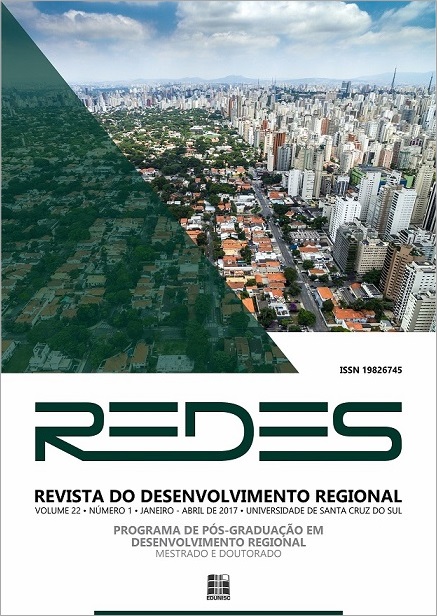Políticas habitacionais, segregação residencial e desigualdade no acesso às políticas públicas: uma análise a partir do acesso a serviços públicos de saúde
DOI:
https://doi.org/10.17058/redes.v22i1.8518Palabras clave:
Nova pobreza. Segregação residencial. Políticas públicas. Serviços de saúde.Resumen
O artigo apresenta uma análise sobre a repercussão das políticas de habitação social e de direito à moradia, desenvolvidas pelo governo brasileiro a partir de 2009, sobre a dinâmica de reprodução social de populações pobres. Tomando como referência empírica um projeto habitacional do “Programa Minha Casa, Minha Vida”, na cidade de Santa Cruz do Sul (RS), o estudo utiliza as categorias de “nova pobreza” e de “segregação residencial” como referências teóricas para avaliar como esses programas afetam as redes de sociabilidade das populações pobres, (re) definindo o seu acesso a bens e serviços públicos, em especial serviços de saúde.Descargas
Los datos de descarga aún no están disponibles.
Descargas
Publicado
2016-12-31
Número
Sección
Desenvolvimento Urbano e Regional: Processos, Políticas e Transformações Territoriais
Licencia
Declaración de Derecho Autoral y Transferencia de Derecho Autoral El autor debe declarar que el artículo es original (no fue publicado previamente), no infrinyendo cualquier derecho autoral o otro derecho de propiedad de terceros. Sometido el artículo, la Revista Redes se reserva el derecho de efectuar, en los originales, alteraciones de orden normativo, ortográfico y gramatical, con vistas a mantener el padrón culto de la lengua, pero respetando, el estilo de los autores. Los trabajos publicados pasan a ser propiedad de la Revista REDES, siendo que, las opiniones emitidas por los autores de los artículos son de responsabilidad de los mismos.Cómo citar
Cadoná, M. A., Tirelli, C., & Coutinho Areosa, S. V. (2016). Políticas habitacionais, segregação residencial e desigualdade no acesso às políticas públicas: uma análise a partir do acesso a serviços públicos de saúde. Redes, 22(1), 326-345. https://doi.org/10.17058/redes.v22i1.8518



